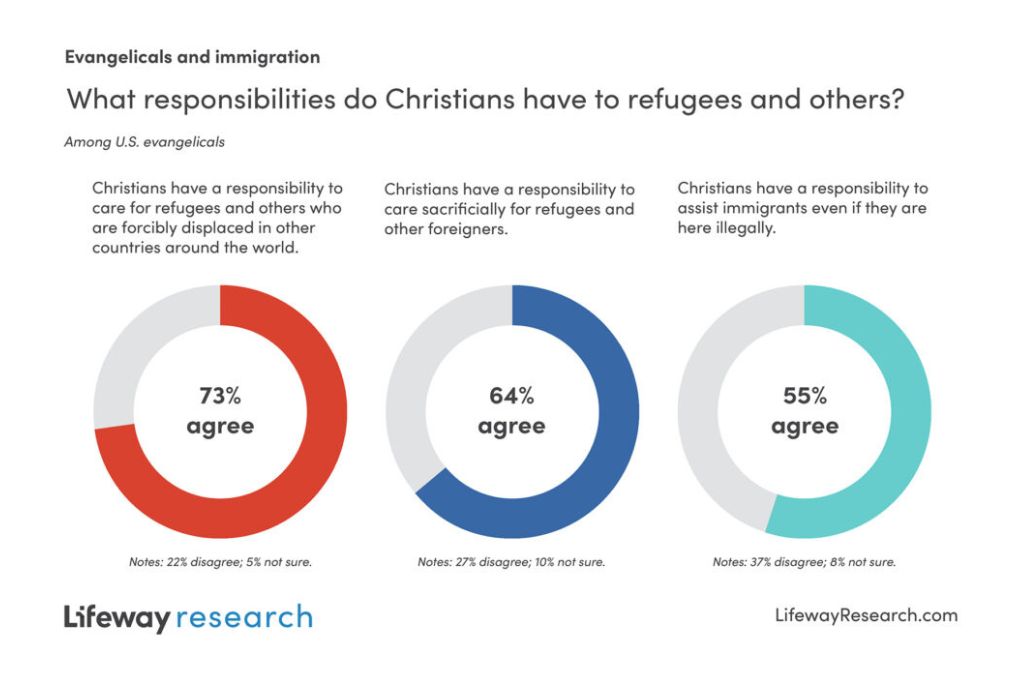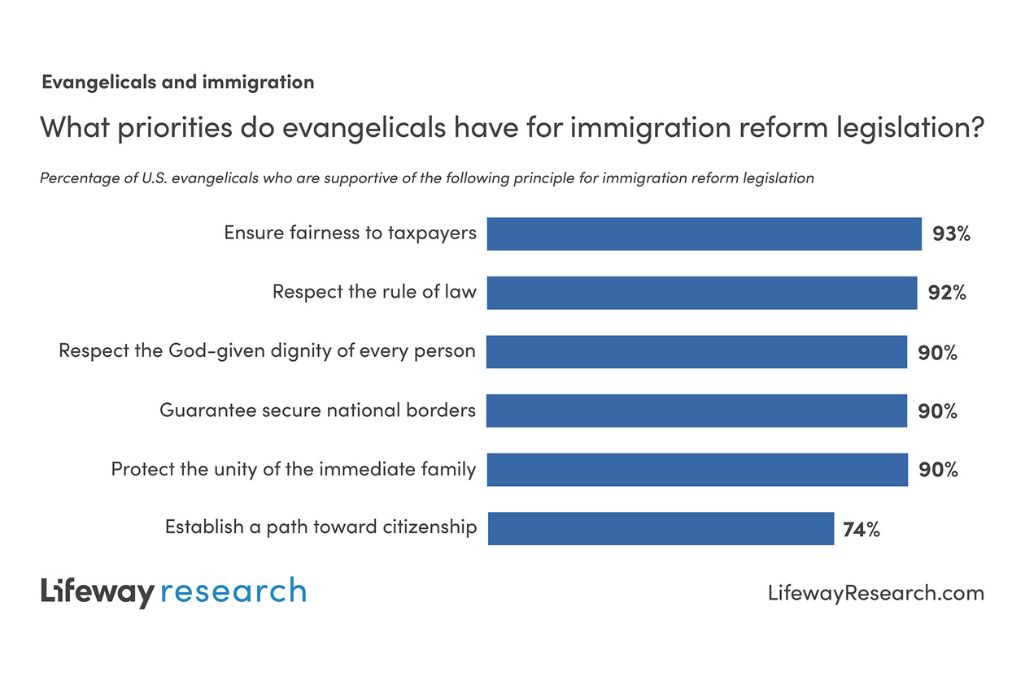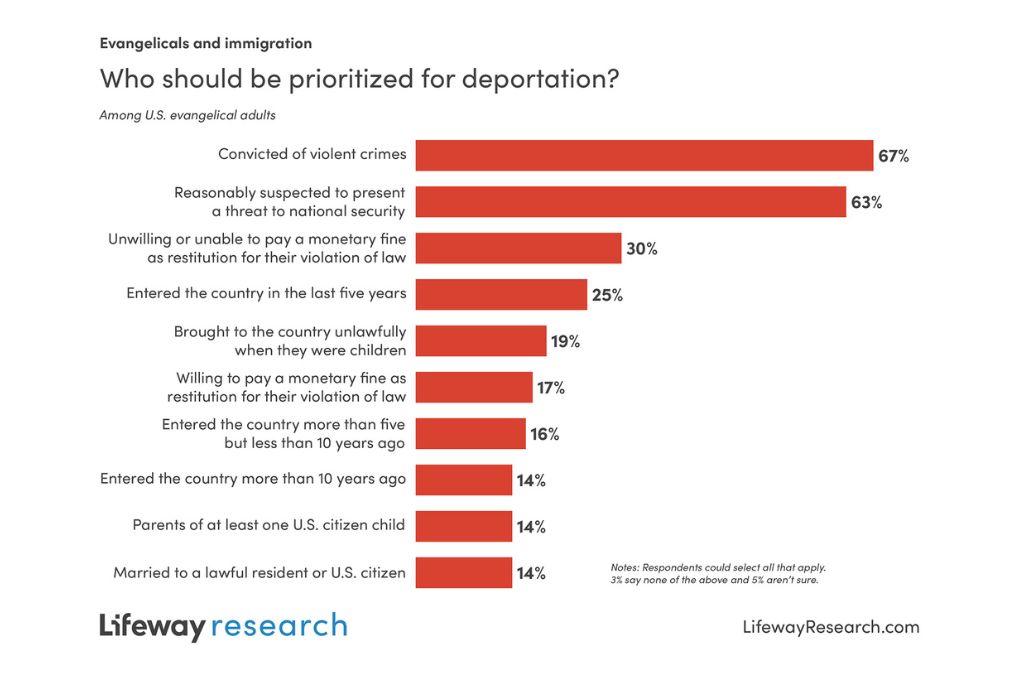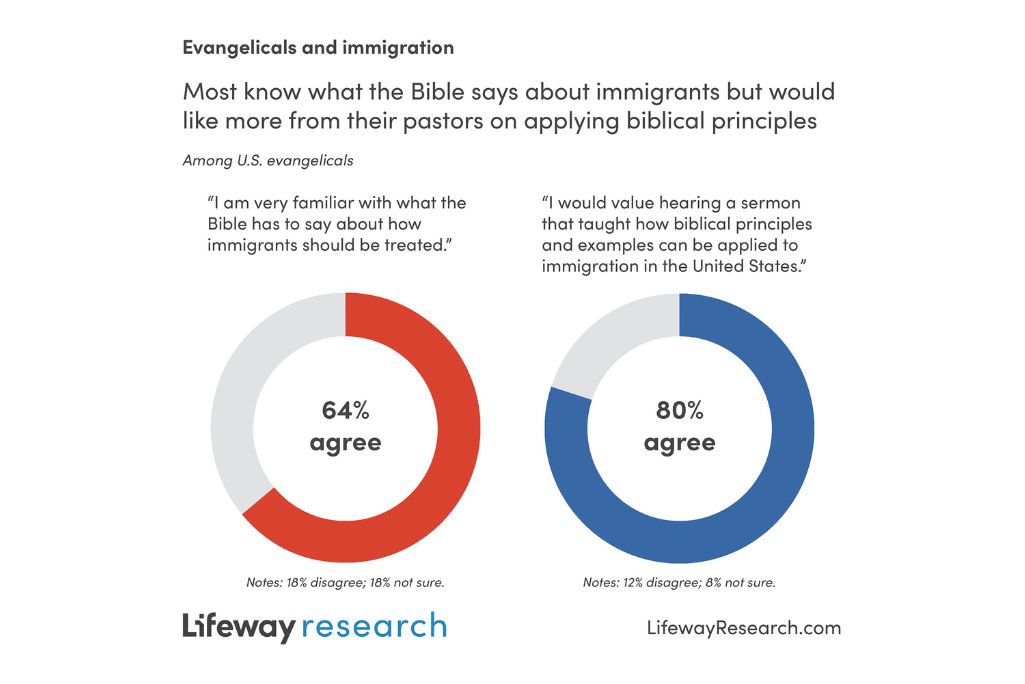
BRENTWOOD, Tenn. — Many U.S. evangelicals may view early immigration and refugee maneuvers by President Donald Trump’s administration as a mixed bag.
Evangelicals want both secure borders and laws that provide avenues for certain illegal immigrants to obtain legal status, according to a Lifeway Research study. They want to deport dangerous illegal immigrants but aren’t as concerned about those who arrived as children and have lived peacefully in the U.S. Additionally, evangelicals recognize personal and national responsibilities to care for refugees and others fleeing their nation of origin.
The Lifeway Research study finds self-identified evangelicals and evangelicals by belief, those who hold four key theological convictions, are predominantly Trump voters and politically conservative. They also see their faith as a primary influence on their views of immigration and related political issues.
Studies over the past four years show stability among the perspectives and priorities of evangelicals concerning immigration. The 2025 study was sponsored by the Evangelical Immigration Table, World Relief, the National Latino Evangelical Coalition and the National Association of Evangelicals and was conducted by Lifeway Research.
“Over the past several years, through all the rhetoric of a tumultuous political season, evangelicals’ views on immigration issues have actually been remarkably stable,” said Matthew Soerens, vice president of advocacy and policy for World Relief. “The big news here is how little has changed despite the prominence of immigration-related rhetoric in the presidential campaign. Most evangelicals — whether the majority who voted for President Trump or the minority who voted for Vice President Harris — still want the same commonsense things from immigration policy they wanted in past surveys.”

Potential political issues
Soon after taking office, Trump indefinitely suspended the U.S. Refugee Admissions Program saying the nation “lacks the ability to absorb large numbers of migrants, and in particular, refugees, into its communities in a manner that does not compromise the availability of resources for Americans, that protects their safety and security, and that ensures the appropriate assimilation of refugees.” Additionally, the U.S. State Department suspended funding to groups that assist refugees.
Evangelicals have been a consistent voting bloc supporting Trump during his three presidential campaigns. Politically, half of evangelicals in the United States (50%) describe themselves as conservative, including 26% who say they are very conservative, according to the Lifeway Research study. Around a third (34%) say they’re moderate, while few see themselves as liberal (14%). In the 2024 election, 61% voted for Trump, while 33% supported former Vice President Kamala Harris.
With these political preferences, most evangelicals voice support for refugees. Seven in 10 (70%) say the U.S. has a moral responsibility to accept refugees, including 34% who strongly agree. Around a quarter (23%) disagree. That number is statistically unchanged from a January 2024 Lifeway Research study.
Around 3 in 4 evangelicals (74%) say they would support a bipartisan Senate bill that would allow Afghan allies evacuated by the U.S. military to apply for permanent legal status after undergoing additional vetting.
“Evangelicals’ care for refugees and immigrants is as steady as their political preference, but some leaders may not be listening,” said Scott McConnell, executive director of Lifeway Research.
Evangelicals are more split over reintroducing a “zero tolerance” policy along the U.S.-Mexico border that led to the separation of children from parents. The policy was terminated by the first Trump administration in June 2018. Currently, 45% of evangelicals would support reintroducing the policy, while 43% oppose such a move, and 12% are not sure.
As Trump moves on his campaign promise of deporting illegal immigrants, evangelicals say those efforts should prioritize criminals and security threats. Most want deportations to focus on individuals who have been convicted of violent crimes (67%) or those reasonably suspected of presenting a threat to national security (63%). Fewer believe enforcement should prioritize those who are unwilling or unable to pay a monetary fine as restitution for violating the law (30%) or those who entered the country in the last five years (25%).
Fewer than 1 in 5 evangelicals believe deportation should focus on those who were brought to the country unlawfully as children (19%), would be willing to pay a monetary fine as restitution (17%), entered the country more than five years ago but less than 10 (16%), entered the country more than 10 years ago (14%), are the parents of at least one U.S. citizen child (14%) or those who are married to a lawful resident or U.S. citizen (14%).
“A large majority of evangelicals do not want immigrants unlawfully in the country to be prioritized for deportation except if they have been convicted of violent crimes or pose a threat to national security,” McConnell said. “Less than 1 in 6 evangelicals value deporting undocumented immigrants whose immediate family has legal status or who have been in the country for more than five years. These are their neighbors and families they don’t want to see divided.”

Future legislation
U.S. evangelicals believe legislative steps should be taken to address the immigration issue. Four in 5 (80%) say it’s important that Congress passes significant new immigration legislation this year. With those changes, most want to make it harder for new immigrants to enter the country illegally but easier for some of those already here to earn citizenship.
Around 3 in 4 (76%) say they would support changes to the U.S. immigration laws that would both increase border security measures and establish a process so immigrants unlawfully in the nation could earn permanent legal status and eventually apply for citizenship if they pay a fine, complete a criminal background check and complete other requirements during a probationary period.
If a political candidate supported those dual changes, evangelicals say they would be more likely to vote for them in future elections. Around 2 in 3 (64%) say supporting reform with both of those aspects makes them more likely to vote for a candidate. Far fewer (12%) say they would be less likely to back a candidate who supported such reforms.
Considering immigration reform legislation, evangelicals want lawmakers to keep several priorities in mind. Around 9 in 10 believe reform should ensure fairness to taxpayers (93%), respect the rule of law (92%), respect the God-given dignity of every person (90%), guarantee secure national borders (90%) and protect the unity of the immediate family (90%). Three in 4 support potential legislation that establishes a path to citizenship for those who are here illegally, are interested in becoming legal citizens and meet certain qualifications (74%). Support for each of those priorities has increased among self-identified evangelicals since a 2015 Lifeway Research study but has remained stable since a 2022 study.
Four in 5 evangelicals (81%) would support Republicans and Democrats working together on a combination of immigration reforms that strengthen border security, create a pathway to citizenship for undocumented immigrants who came to the United States as children, known as “Dreamers,” and provide a reliable number of screened, legal farmworkers.
“A large majority of evangelicals want increased border security, Dreamers to be able to apply for citizenship and farming needs to be met with enough screened immigrant farm workers each year,” McConnell said. “Evangelicals want a system that is both fair and alleviates potential threats to national security.”

Personal views on immigration
Overall, evangelicals in the U.S. see legal immigration as helpful to the country. A quarter (26%) say legal immigration is helpful and we should increase the number approved in a year. Around 2 in 5 (40%) believe it is helpful and we should maintain the current number of legal immigrants approved.
One in 5 (20%) agree it’s helpful but want to decrease the number approved. Fewer say legal immigration is harmful and we should decrease those who are approved (8%) or that we should completely stop approving legal immigrants (6%).
Many evangelicals worry specifically about the recent number of immigrants that have come to the United States. More than 2 in 5 say that amount is a drain on economic resources (44%) and a threat to the safety of citizens (43%). Additionally, 37% say the number is a threat to law and order, and 29% believe it’s a threat to traditional American customs and culture.
Positively, many evangelicals say the number of recent immigrants presents an opportunity to introduce them to Jesus Christ (42%), an opportunity to show them love (37%), an improvement to America’s cultural diversity (25%) and a boost to entrepreneurial activity (16%).
Thinking about moral responsibilities, about 2 in 3 evangelicals (64%) believe Christians have a responsibility to sacrificially care for refugees and other foreigners. Asked specifically about refugees and others who are forcibly displaced in other countries beyond the United States, 73% said Christians have a responsibility to care. Most (55%) also say Christians have a responsibility to assist immigrants even if they are here illegally.
“It’s easy to presume the loudest evangelical voices on television or social media — who tend to advocate the extreme positions of either mass deportation and shutting out refugees on one hand or open borders and amnesty on the other — are the majority opinion, but this polling confirms my anecdotal experience in local evangelical churches across the United States,” said Soerens, who also serves as the national coordinator for the Evangelical Immigration Table.
“There’s a clear consensus for secure borders and for sustained or increased levels of legal immigration, particularly for refugees fleeing persecution,” Soerens said. “Evangelicals advocate for deporting violent criminals but also for establishing an earned path to citizenship for undocumented immigrants able to pass a background check and meet other appropriate requirements.”
When asked what has most influenced their thinking on immigration, evangelicals primarily say the Bible (23%). Other significant influences include immigrants they have observed (16%), the media (14%), immigrants they have interacted with (11%) and friends and family (10%). Fewer say they have been most influenced by the positions of elected officials (8%), their local church (5%), national Christian leaders (4%) or teachers or professors (2%).
Influences included most often among evangelicals’ top three most influential sources on the topic of immigration are immigrants they’ve observed (42%), friends and family (40%), the Bible (38%), the media (37%) and immigrants they’ve interacted with (35%).

Church involvement and perspective
One of the ways evangelicals learn about and engage with the topic of immigration and immigrants is at church. Half (50%) of U.S. evangelicals say they attend church at least once a week. Another 10% say around twice a month, 5% once a month and 11% several times a year. One in 4 (25%) rarely or never attend.
Among those who attend at least several times a year, 52% say their church has at least some first-generation immigrants, including 13% who say their church is composed of many immigrants born outside of the U.S. and 2% who say nearly everyone in their church is first-generation. Additionally, around 1 in 5 (18%) U.S. evangelicals are first- or second-generation immigrants, including 6% who say they were born outside of the U.S.
“The care for immigrants and refugees expressed by the responses of the majority of evangelicals in this survey correlates with actions the Bible commands. Yet not all evangelicals are familiar with these numerous biblical statements, nor do all have compassion for such people today,” said McConnell.
Most evangelicals (64%) say they are very familiar with what the Bible has to say about how immigrants should be treated. Still, 4 in 5 (80%) say they would value hearing a sermon that teaches how biblical principles and examples can be applied to immigration in the U.S. Previous Lifeway Research studies have found most churchgoers don’t want political endorsements from their pastors, but they do expect to hear teaching that addresses current issues.
Around 1 in 4 evangelicals (28%) say they have heard immigration discussed in their local church in a way that encouraged them to reach out to immigrants in their community, while 64% disagree.
Almost 7 in 10 evangelicals (69%) say they have never been involved in a ministry that served refugees or other immigrants. Around 3 in 10 say they have, including 13% currently and 18% in the past.
“I hope this research will give courage to pastors,” said Soerens. “Not only do their people crave biblical teaching on this topic, but the likelihood that the immigration policy ramifications of biblical principles will upset their congregants is slim, since super-majorities of evangelicals already support commonsense, compassionate principles on immigration rooted in Scripture.”
Still, evangelicals believe caring for these individuals is a responsibility of the church. Almost half (46%) say churches in the U.S. should be at the forefront of responding to the increase of people forced to flee their homes due to persecution or conflict. Another 28% say the church should be concerned with the increase but it is not a top priority. Fewer say the church should leave it to governments to address the issue (12%) or that they are unsure (13%).
U.S. evangelicals rate many of the issues related to displacement as one of the three most urgent global issues that need the attention of churches in the U.S., while the issue itself ranks closer to the bottom. Almost half say one of the top issues the church should give attention to is war and violent conflict (45%) and human trafficking (45%). More than a third point to orphans and vulnerable children (36%) and religious persecution (35%).
Around a quarter of American evangelicals believe evangelization (26%), global health crises (25%) and discipleship (23%) are top global issues that need our attention. Fewer say the same about climate change (21%), changing attitudes toward gender and sexuality (20%) and forced displacement and migration (13%).
“At a time when 120 million people around our world have been forced from their homes, we believe the refugee and displacement crisis should be a priority of the American church,” said Soerens. “While American evangelicals seem to be less focused on displacement than on some of the underlying causes of displacement, such as war, conflict and religious persecution, we hope the church will increasingly take the lead in responding to this global crisis.”
For more information, view the complete report and visit LifewayResearch.com.
Methodology
The study was sponsored by the Evangelical Immigration Table, World Relief, National Latino Evangelical Coalition and the National Association of Evangelicals. The online survey of 1,004 Americans was conducted Jan. 13-21, 2025, using a national pre-recruited panel. Quotas and slight weights were used to balance gender, age, region, ethnicity and education to more accurately reflect the population. The survey was completed by people who self-identified as evangelical or qualified as evangelical by belief.
The completed sample is 1,004 surveys, including 525 surveys completed by those with evangelical beliefs and 920 completed by self-identified evangelicals. The sample provides 95% confidence that the sampling error does not exceed plus or minus 3.1%. This margin of error accounts for the effect of weighting. Margins of error are higher in sub-groups. Comparisons are made to an online survey by Lifeway Research of 914 self-identified evangelicals Jan. 15-22, 2024, 911 self-identified evangelicals Aug. 8-19, 2022, and 1,000 self-identified evangelicals Feb. 17-27, 2015.
Self-identified evangelicals are those who consider themselves an evangelical, a born-again or a fundamentalist Christian. Evangelical beliefs are defined using the National Association of Evangelicals (NAE) Lifeway Research Evangelical Beliefs Research Definition based on respondent beliefs. Respondents are asked their level of agreement with four separate statements using a four-point forced-choice scale (strongly agree, somewhat agree, somewhat disagree, strongly disagree). Those who strongly agree with all four statements are categorized as having evangelical beliefs:
- The Bible is the highest authority for what I believe.
- It is very important for me personally to encourage non-Christians to trust Jesus Christ as their Savior.
- Jesus Christ’s death on the cross is the only sacrifice that could remove the penalty of my sin.
- Only those who trust in Jesus Christ alone as their Savior receive God’s free gift of eternal salvation.
(EDITOR’S NOTE — Aaron Earls is a writer for LifeWay Christian Resources.)


